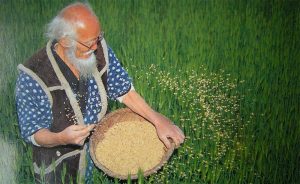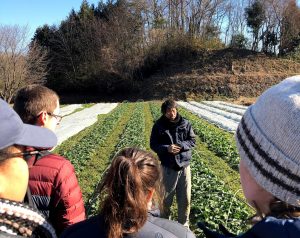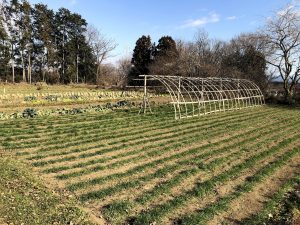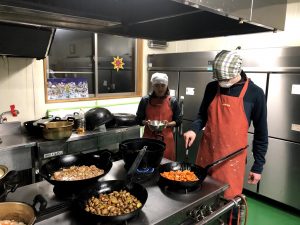Our experiences at ARI, visits with organic farmers, and readings have really emphasized the interconnectedness of nature and agriculture. Osamu-san, Asami-san, and Masanobu Fukuoka all discussed the importance of organic farming methods, especially as our planet faces more environmental challenges. Osamu-san taught the first class we had here at ARI. He taught us about organic farming and gave us a tour of the ARI campus, explaining that if we break the ecosystem or food chain, we can no longer call it organic farming because it’s not natural. In order to be worthy of the “organic” title, we must follow the law of nature. Fukuoka expands on this idea when he explains the many processes and values involved in organic farming in his book, The One Straw Revolution. He stresses the importance of a passive farming approach. By living in harmony with nature and allowing the ecosystem to regulate itself, Fukuoka argues that agriculture and nature can coexist in a symbiotic relationship and therefore increase crop yield.

Masanobu Fukuoka spreading seed in his field
Runoff pollution, soil erosion, habitat destruction, water depletion, and deforestation are just a few environmental problems caused in part by unsustainable agricultural practices. Clearly agriculture poses a threat to environmental health. In Avenall’s Transnational Japan in the Global Environmental Movement, he writes about Tsuru Shigeto and his push for sustainable development as a means of regulating our impact on the planet. Tsuru appeals to human welfare as a guiding principle of environmentalism, claiming that we must protect the environment because the pollution and environmental harm we have caused is an injustice to the world and the people living on it. Even though Tsuru mostly focused on economic and structural development, the same argument can be extended to agriculture because it too is significant in the development of nations. If we continue with unsustainable farming processes then agriculture continue to negatively affect the environment.

Learning about organic farming practices in Kino Shi Juku
The main solution to the problems caused by the harmful agricultural practices is organic farming. In his book, Fukuoka talks in length about the importance of organic farming for the well-being of the planet. He is opposed to the modern practices commonly found around the world such as the usage of chemical fertilizers, pesticides, and overtilling of the land. Fukuoka writes, “that this straw is neglected is being neglected is proof of the disorder of modern farming. The barrenness of these fields reveals the barrenness of the farmer’s spirit. It challenges the responsibility of government leaders, and clearly points out the absence of a wise agricultural policy” (180). Because there are not updated agricultural regulations or incentives, farmers are choosing to avoid sustainable organic farming for more “advanced” and “efficient” methods. They are not “following the law of nature” like Osamu-san and many others have accentuated.
If we want to create environmental policy that prioritizes ecosystem and global environmental health, we must focus our efforts towards organic farming and incentives to draw agricultural leaders to change their ways. I have seen firsthand how valuable organic farming can be. Effective environmental policy would allow for sustainable development of nations and their economies (with special attention given to the UN’s 17 Sustainable Development Goals), provide sufficient protections for ecosystems, include incentives for organic farming, and restrict against non-organic farming. This may seem implausible, but I have seen firsthand how effective organic farming can be. ARI grows 90% of its own food, which is enough to sustain the dozens of people living on their campus. Other rural communities also have organic farmers that supply food for families in the area through CSA programs. On the surface it may seem like a big step back into the past, reverting to traditional farming practices. However, when you really consider it, organic farming is the way of the future, especially if we want to have a future on this planet.

ARI grows 90% of its own food

Recent Comments